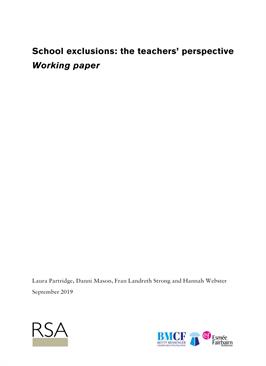In June 2019, the RSA asked over 1,500 classroom teachers and senior leaders from over 1,300 state schools in England about their views on the use of exclusions as part of the NFER Teacher Voice Survey.
The survey asked questions about permanent exclusions (expulsions), fixed-term exclusions (suspensions) and classroom removals (internal exclusions).
Key findings
Despite historically high levels of official exclusions, the vast majority of teachers do not feel that schools are “too quick” to exclude pupils.
Only 8% of all teachers agreed with the statement “overall, schools are too quick to use official exclusions when there is another suitable approach”.
Teachers are largely supportive of the use of exclusions and classroom removals.
86% of all teachers agreed that “being able to officially exclude pupils is essential to provide a good education for all pupils”.
Teachers believe that even internal exclusion can have a detrimental effect over time.
79% of all teachers agreed that repeatedly being removed from lessons “often has a detrimental impact on a pupil’s learning” (although 50% felt that removal from an individual lesson could be beneficial).
Teachers want more support for at-risk pupils but would rather that came from other professionals.
70% of head teachers believed that being able to access more frequent support from Child and Adolescent Mental Health Services (CAMHS) or early help services would help them reduce the number of times that they removed a pupil from the classroom.
Download the working paper (pdf, 3MB)
Read Laura's blog on why teachers want help to prevent school exclusions
pdf 3 MB
Authors




